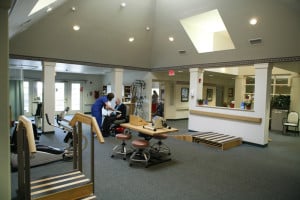You made a packing list for camp when you were young. You made a packing list for your European vacation. You pre-packed a bag when you were pregnant for that spur of the moment trip to the hospital. Now that you’re older, you or a loved one will likely need a post-hospital Rehab packing list. Knowing what you’ll need during recovery after a hospital stay will save you time and money by avoiding extra trips home or to the store to pick up additional essentials.
Don’t wait until you or your loved one is being discharged to think about what you/they’ll need in a rehab center or at home. The list below was created with the help of Rita Bentley, LBSW, a long time social worker, and Community Relations Manager with Senior Helpers in Michigan to give you an idea of what you will need for your post-hospital rehab stay:

1. Clothes: Obvious? Not always. And make sure you bring the right type of clothes. Lightweight, comfortable, athletic clothing — think ease of movement for therapy and ease of dressing — in breathable fabrics. Also bring socks and under-garments. Select clothes that layer (T-shirts/Tops with jackets/sweaters) to accommodate changes in body temperature. Also, bring clothes your loved one will wear home, such as items with buttons. This will provide the opportunity to practice dressing before going home.
Also, pajamas, robe, and slippers with treads, but nothing with an open back
Comfortable non-slip shoes. Think athletic shoes. No open back shoes. No heels.
2. Hygiene Products: hairbrush or comb, toothbrush/toothpaste (sometimes the facility will provide toothpaste, but your loved one will likely prefer the taste of their own brand), shampoo/conditioner, hairstyling products, blow-dryer, make-up, dentures (with container, cleaners, grip product), deodorant, and tissues (though tissues are usually provided in the facility, the institutional brands are not as soft and thick as store bought brands).
Don’t bring any products that are expensive as these can disappear or get “borrowed.” For example, some women use expensive moisturizers and make-up. These are best left at home.
3. Glasses, Hearing aids, and other assistive devices. CPAP/BIPAP machines & distilled water. Tell the nurse to lock up any items when not in use to keep them safe. Hearing aids often go missing and they are expensive to replace and usually not covered by insurance.
Cellphone, cellphone charger, address book or list of contacts. Though there is a phone in the room, some people prefer their own phone which contains the phone numbers for their key contacts.
4. Comfort Items: Your loved one may feel more at home with their own pillow and blanket.

5. List of prescription medications. Just a list, (although they will get one from the hospital). DON’T bring any medications because the rehab center will provide these. There may be an exception if your loved one takes a very expensive medication that the facility cannot afford to provide. In this case, they may allow you to bring it in, but this will require prior approval and will likely be kept at the nurses station.
6. Insurance cards and Driver’s License: The facility will make a copy for their records. If your loved one does not have a driver’s license, bring a picture ID if possible.

7. Pictures of loved ones or other tokens of love. Bring only those items that you can replace in case something happens to it/them.
8. Reading materials, crossword books, or other materials that will help keep both you and your loved one entertained. Some residents bring an iPad. It’s a good idea to have a lock for this to secure it to the nightstand so that it does not go missing.
9. Notepaper/notebook and pen/pencil. This is great to have handy to record a doctor’s diagnosis and recommendation so no one, including the patient, has to commit such important information to memory. It is also a great way to keep track of any items you may want to remember to bring on your next visit.
10. A Cravaat® dining scarf or Napkin at Your Neck® in place of an adult bib to help keep your clothes clean during meals.
What NOT to bring:
1. Jewelry or other valuables: Don’t bring anything of high value. The facility is under no obligation to replace them, and there is rarely a clear cut answer to what happened to the missing item.
2. Large sums of cash. Though you may want to have a few dollars on hand, generally you won’t need to purchase anything in the facility.
If you are a caregiver, keep this list in your file of helpful hints in case your loved one has an event that puts them in the hospital and needs to go to rehab before returning home. You never know what life will bring. It’s always good to be prepared so you can save yourself time in the long run.

